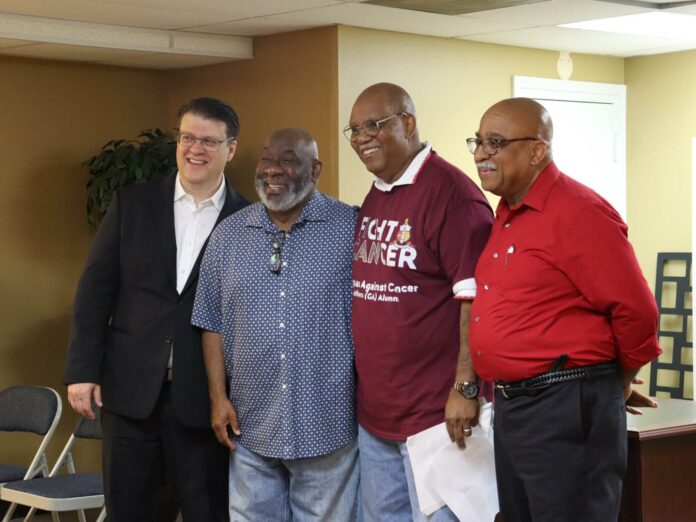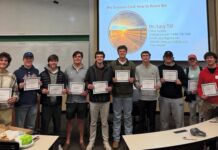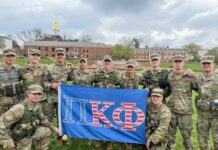On Saturday at 9 a.m., the Athens alumni chapter of the Kappa Alpha Psi Fraternity, Inc. hosted a Prostate Cancer Summit at Mt. Pleasant Baptist Church to raise awareness about the disproportionate impact of prostate cancer on African American men.
The program featured primary care physician Dr. James L. Brown as the keynote speaker and a panel of survivors and medical experts facilitated by Lamar Handy, including Dr. Brown, Dr. Petros Nikolinakos, Dr. Andre Mackey, Mary Dunn and Al Lawrence. The event also provided free cancer screenings and treatment resources.
According to the Mayo Clinic, African American men are not only at a greater risk of developing prostate cancer but also for that cancer to be more aggressive than for people of other races. Although there is little conclusive research on the causes of this phenomenon, medical experts at the summit shared that there are ways to prevent prostate cancer, and to treat and support those suffering from it.
“Education about healthcare among women, men and children can take us a long way,” Dr. Brown said.
Dr. Brown said in his keynote speech that the lack of Black male doctors and unequal access to healthcare are some contributing factors to the higher rates of prostate cancer among African American men.
Additionally, Dr. Brown said the most common form of screening, the digital rectal exam (DRE), is less accurate for Black men. Instead of the DRE, Dr. Brown recommended that patients get PSA tested to measure levels of prostate-specific antigens in the blood — high levels of which can indicate cancerous cells.
Dr. Nikolinakos, a medical oncologist and managing partner at the University Cancer and Blood Center (UCBC), added that people with a family history of cancer should get tested regularly.
According to the American Cancer Society, having a father or brother with prostate cancer more than doubles the risk of contracting the disease. However, all men should still get tested regularly regardless of risk factors because it is easier to cure prostate cancer if caught early.
Survivors and healthcare professionals alike urged audience members to be proactive with their health. Dr. Nikolinakos pointed out that UCBC offers options to those without insurance, and Dr. Mackey, a pharmacist at CVS Health Hub and a prostate cancer survivor himself, said that indigent care programs can provide free or low-cost medications to patients. Many pharmaceutical companies, state programs and nonprofits in Georgia offer patient assistance programs.
Panelists also shared their personal experiences with prostate cancer. Dr. Mackey, who celebrated his seventh year cancer-free on the day of the summit, touched on the difficult aspects of prostate cancer.
“There’s some uncomfortable stuff that we don’t talk about around prostate cancer and the treatment and the disease itself,” Dr. Mackey said. “You know, the risk of urinary incontinence, the risk of erectile dysfunction. I was concerned about both of them.”
Lawrence, a retired marketing agent, spoke about the psychological impact of prostate cancer.
“For me it was more of a psychological than physical,” Lawrence said. “When you hear that ‘C’ word, you don’t think about anything but that ‘C’ word. You don’t hear anything else.”
Those impacted by prostate cancer also emphasized the importance of support. Rick Dunn, executive director for the nonprofit A-CC High School Completion Initiative and inspiration for the summit, thanked the Kappa Alpha Psi alumni for their support throughout his own battle with cancer.
“I just want to thank you all for showing up today,” Dunn said. “It means a lot to me in a lot of different ways.”






















